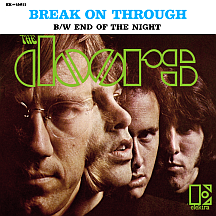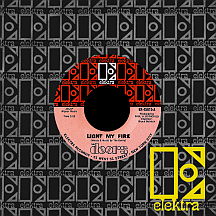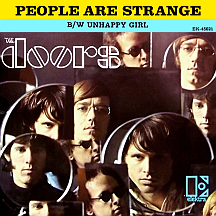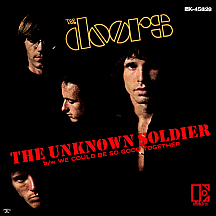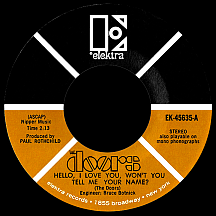THE DOORS
In 1973 there were three Doors left on the verge of breakup. Keyboardist Ray Manzarek, guitarist Robbie Krieger and drummer John Densmore had dealt with Jim Morrison's death by keeping the band going. Eyes peeled for a new lead singer, it quickly became obvious there could be no substitute for Jim; the essence of the Doors revolved around his personality, like it or not. So the group continued awhile with Ray and Robbie doing the vocals. Jazzy, fluty "The Piano Bird" was the final single in early '73. Shortly afterwards the trio separated.
The release of Full Circle came in the summer of '72 wih its oddball south-of-the-border-stained single "The Mosquito" (albeit with a Manzarek organ passage that watermarked the track as a Doors song). Vocal by Krieger: 'No me moleste...' ("Don't bother me!") '...mosquito! Just let me eat my burrito!' had met with indifference, as had the album Other Voices and its much less Doorslike 45 "Tightrope Ride" (vocal by Manzarek) from the late months of 1971. These efforts, born in a stressful atmosphere, were a stark departure from the Doors of just a hundred or so days previous.
Morrison was buried at the Père Lachaise Cemetery in Paris, France. On July 3, 1971, his girlfriend, Pamela Courson, discovered his lifeless body in the bathtub of the Paris apartment they had shared for three months following the completion of the L.A. Woman album. It was she who received a large portion of his money per his will. She had known Jim since 1965, during the early phase of the band's existence as a live act. Pamela died of a drug overdose nearly three years later at age 27, leading to speculation that she committed suicide in some delusional attempt to go out the way Jim had and be with him in the afterlife.
The sessions for what became the first non-Morrison project were just starting when the devastating news changed the game plan. Ray, Robbie and John somehow completed Other Voices (able, perhaps, to bang it out somewhat economically sans Jim's less disciplined studio methods, thus putting the thing behind them that much sooner). "Riders on the Storm," with its eerie imagery ('There's a killer on the road, his brain is squirmin' like a toad...'), had just begun its ascent on the charts as the last of Jim's Doors hits, casting a cloud, both sonically and genuinely, over that summer. For rock fans despondent over the deaths of Janis Joplin (in October 1970) and Jimi Hendrix (16 days earlier), Morrison's departure completed some kind of bizarre, inevitable trilogy, placing the three as figureheads in a cultish pop-culture-created category where musicians who died between their 27th and 28th birthdays are idolized.
The Doors appeared to have recaptured the magic of their formulative mid-'60s recordings with L.A. Woman, the first project absent of any involvement from longtime producer Paul Rothchild. Its first single, "Love Her Madly," was written by Krieger about his turbulent relationship with a girlfriend who later became his wife. Bizarre lyrical imagery ('...sing a lonely song of a deep blue dream...seven horses seem to be on the mark...') adds to its mystique. It was their biggest hit since "Touch Me" two years prior.
Jim's public drunkenness and erratic behavior in concert got him into "hot water" many times. His drug-fueled onstage ranting, becoming more vulgar and out of control as time passed, forced suspension of a tour towards the end of 1970 and effectively forced the group to stop appearing live as a foursome; with only six months left for Jim, there were no more concerts...ever. The year hadn't gone so well as any 12-month stretch of the mid- to late-'60s. Jim had written much of the music for Morrison Hotel; the LP was well received by critics and sales were good, but it had no signature hit to clearly mark its place in their timeline (the two-sided "You Make Me Real" and "Roadhouse Blues" met with lukewarm reception at radio and on the charts that spring).
Four singles from The Soft Parade made varying impacts at radio in 1969. "Runnin' Blue," referencing Otis Redding's death, broke into countrified verses sung by Krieger; "Tell All the People" ('Follow me across the sea, where milky babies seem to be...') is a swatch of poetry open to wide interpretation...hold on a sec. News bulletin, Miami, March 1: Jim showed up an hour late for a scheduled concert, went on a drunken rage laced with generous doses of profanity (not the first time he'd done that) and (according to some) disrobed and made obscene gestures, prompting an arrest and trial in August, resulting in his being sentenced to six months' hard labor, date to be determined. He never served it. Primarily because his death prevented it.
April 1969...midpoint: 27 months after the first album's release and 27 months before Morrison's permanent departure; "Wishful Sinful"'s poetry set to an orchestra with strings had a less-enthusiastic-than-expected reception. Touch Me," with strings and a horn section (climaxing with the line 'Stronger than dirt,' keeping Ajax detergent's White Knight alive in our memories), was what you might call a love song (the suggestive kind that is, with subtleties gliding over the heads of anyone with censoring tendencies) unveiled at the end of 1968, becoming the band's third top ten hit a couple of months later.
"Hello, I Love You, Won't You Tell Me Your Name?" (shortened almost immediately to "Hello, I Love You") arrived with inquisitorial fanfare, conceived in '65 with a structure similar to The Kinks' "All Day and All of the Night." The single hit number one in August 1968 (Waiting for the Sun directly becoming the group's only number one album) just as Jose Feliciano's acoustic guitar remake of their groundbreaking hit, "Light My Fire," went top five, placing two Doors songs simultaneously side-by-side near the chart's apex. "The Unknown Soldier" (also from Waiting) had appeared a few months earlier, a war protest song and promo film with a graphic firing squad sequence; many radio stations resisted playing it. Mr Mojo Risin (the letters in Jim Morrison's name, mixed up Scrabble-style) rapidly let success go to his head (with the help of alcohol and hallucinogens).
New Haven, Connecticut, December 1967: Morrison's onstage obscenities during their concert ended in his arrest, but charges were later dropped. Many more tirades were in the offing. The band was in such high demand throughout 1967 that they were on the road for most of the year. Morrison explored his paranoic alienation from society, outside-looking-in style, with "People Are Strange" (gotta love the honky-tonk horror-show piano), the fall follow-up to the band's explosive summertime (and forevertime) hit.
"Light My Fire" put the Doors on the tube September 17, 1967 as guests on The Ed Sullivan Show. They were asked to change the word 'higher' due to concerns about to its "possible" reference to drugs (The Rolling Stones had recently complied when Ed asked them to change one potentially offensive line in "Let's Spend the Night Together" to 'some time together'). But Jim sang "Light" with the line intact. Sullivan banned them from future appearances. Jim claimed he was just nervous and slipped. No dice, said Ed. Ah, the pitfalls of staging a high-rated, live TV show each week!
Ultimately "Light My Fire," timed perfectly (if accidentally) to rule as the song of the popularly tagged "Summer of Love," was such a phenomenon that top 40 stations began playing the full version (if only in the evenings), possibly inspired by what KMPX-FM in San Francisco, which had debuted its trailblazing "underground" rock format in August, was doing in all dayparts. This rare acceptance of a seven-minute-long track at top 40 predated what became common practice at stations like Pasadena's free-form rock outlet KPPC-AM and FM (which didn't make its premiere on the Los Angeles airwaves until January 1968) and the many rock stations that rebelliously (and later corporately) enjoyed great success in the years to come.
Arriving in April '67 on the heels of the underperforming debut 45, "Light My Fire" had inspiration coming from several musical sources: Krieger (who wrote many of the group's best songs) based it on "Hey Joe" by The Leaves; the bass line was an elaboration of "Blueberry Hill" by Fats Domino; Manzarek lifted its opening organ riff from an excerpt of Johann Sebastian Bach's "Two and Three Part Inventions." The song's title became a buzz phrase in the hippie culture of the summer of '67. The master was trickily edited to a 2:52 length, sped up slightly with the elongated instrumental bridge excised (ballad "The Crystal Ship" on the flip was a brilliant bonus, easily compensating for the truncated A side). After a slow start in May it did a steady roll up the charts, hitting number one at the end of July.
First impression "Break on Through (To the Other Side)" was based on Ray Charles' 1959 hit "What'd I Say," the arrangement taken straight off Kenny Burrell and Jimmy Smith's 1963 jazz recording of the song. The Doors made appearances locally on Shebang, hosted by Casey Kasem, and channel 9's Boss City with KHJ radio's Sam Riddle; the single was a decent-sized hit in Los Angeles in March '67 but surprisingly failed to catch on across the U.S.
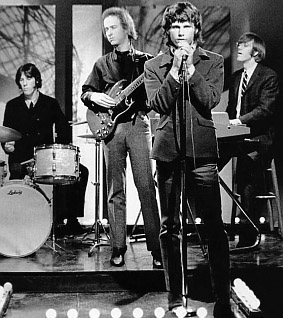
Longplay kickoff disc The Doors was recorded in about a week during August of 1966 and released in January '67 after Elektra president Jac Holzman, and Paul Rothchild, on the lookout for more rock acts like Love (who had been signed to the label several months earlier, successful by Elektra's then-modest standards with the hits "My Little Red Book" and "7 and 7 Is"), checked out their Whisky A Go Go show. Signed to Elektra and, with a repertoire of songs ready to go, they recorded an album's worth of material at Sunset Sound Recording Studios as if trying to complete it before someone got wise to the nonsense and decided to pull the plug. 1966 ended with four guys in an elated state at the prospect of their impending success.
Once the Doors were in place as a four-man band, they settled into a stay at Sunset Strip nightclub London Fog, a modest establishment where their unique sound developed, before moving up the street to the Whisky. Jim Morrison and Ray Manczarek had met the previous summer. "Screamin' Ray" was a member (with his brothers Rick and Jim) of Rick and the Ravens, a band that had been together since 1961. They'd had a single on the Posae label, a hot rod tune ("Big Bucket 'T'") backed with a surf instrumental ("Rampage") and two more on Aura in '65 crediting Manczarek as Ray Daniels, including a remake of Jimmy Dee's 1958 rocker "Henrietta." Drummer John Densmore of The Psychedelic Rangers had joined the group earlier in 1965. Jim began his association with the band that summer after meeting Ray.
Some of Morrison's songs (including "Hello, I Love You" and "Moonlight Drive") were part of a demo recorded in September 1965, shortly after Rick and Jim Manczarek left the band. Morrison sang and Densmore played drums on the demos. Patricia Sullivan was the only Ravens member who stayed on, though briefly, with Manzarek (new spelling), Morrison and Densmore. Robbie Krieger, also of the obscure Rangers (completely forgotten by now if not for its two famous members?) joined near the end of 1965, entering through a swinging door (what else?) that likely bruised Sullivan on the way out.
The name of the soon-to-be superstar Southern Cal rock band came from a line in William Blake's poetic work of the 1790s, The Marriage of Heaven and Hell: "If the doors of perception were cleansed every thing would appear to man as it is, infinite." That, in turn, supplied Aldous Huxley with the title of his written account of taking mescaline, published in 1954 as The Doors of Perception, which later became a handbook of sorts for practitioners of 1960s drug culture. The Doors were off and running by the end of 1965. The name, confusing to many at first, would not be changed. They twisted the knob, entered the portal to the music industry, and turned it upside-down.
NOTABLE SINGLES:
- Break on Through (To the Other Side) - 1967
- Light My Fire /
The Crystal Ship - 1967 - People Are Strange - 1967
- Love Me Two Times /
Moonlight Drive - 1967 - The Unknown Soldier - 1968
- Hello, I Love You /
Love Street - 1968 - Touch Me /
Wild Child - 1969 - Wishful Sinful - 1969
- Tell All the People - 1969
- Runnin' Blue - 1969
- You Make Me Real /
Roadhouse Blues - 1970 - Love Her Madly - 1971
- Riders on the Storm - 1971
- Tightrope Ride - 1971
- The Mosquito - 1972
- The Piano Bird - 1973


